
Guests
- Sherif MansourMiddle East and North Africa program coordinator for the Committee to Protect Journalists.
At least 12 journalists, mostly Palestinians, have been killed over the past 10 days of conflict in and around the Gaza Strip. Sherif Mansour of the Committee to Protect Journalists says it is one of the highest death tolls for journalists covering the conflict since 1992 and calls today it the “deadliest time for journalists in Gaza.” He joins Democracy Now! to discuss the role of journalism in combating misinformation during times of violence and the threat of widespread censorship by Israel and other state actors.
Transcript
AMY GOODMAN: In the first week of fighting in Gaza, the Committee to Protect Journalists reports at least 12 journalists have been killed. More are missing and injured.
We’re joined now by CPJ’s Middle East and North Africa program coordinator, Sherif Mansour.
Welcome back to Democracy Now!, Sherif. In these last few minutes we have — we’ve heard the story of Issam — tell us what you understand about what’s happened to journalists. He was on the Israel-Lebanon border. Israel says they’re looking into it. What’s happening in Gaza?
SHERIF MANSOUR: Well, this is the deadliest time for journalists in Gaza. That is, according to our count, one of the highest tolls for journalists covering the conflict since 1992. Since 2001, we’ve recently published stories of 20 Palestinian journalists who have been killed over the years covering IDF operations. Many of them, 13, were in Gaza before the start of this war. But right now we’re looking at at least 10 Palestinian journalists, mostly freelance photojournalists, for taking outsized challenge and risk in order to tell the story of what’s happening. But there are, in addition to Issam, from Lebanon, at least one or two journalists from Israel who have been killed and went missing since the beginning of the raid on October 7. We are also still investigating a lot of damages to media facilities in Gaza that were bombed over the course of the week, reportedly at least 48 or so. Many were injured. Many lost their homes. And many cannot access the outside world because of lack of internet.
AMY GOODMAN: So, let me ask you: What are the international laws and conventions in place to safeguard journalists and hold those responsible for their killings?
SHERIF MANSOUR: Well, we call on Israel to immediately investigate what happened to Issam and his six colleagues who were injured. We support the Lebanon complaint in the U.N. to make an investigation. And we also call on Brazil, who is presiding right now, on this week, on the U.N. Security Council, to make sure that journalists’ safety is included in any talks that’s happening diplomatically.
AMY GOODMAN: And let me ask you — last week, BBC Arabic journalists Muhannad Tutunji and Haitham Abudiab were reportedly stopped, assaulted and held at gunpoint by Israeli police in Tel Aviv. What do you know about this situation?
SHERIF MANSOUR: Unfortunately, censorship is widespread, not just on covering Gaza in Israel, and we’ve seen and reported a lot of journalists being threatened live, including from Al Araby TV just couple of days ago. And journalists have told us they have received threats, in addition to all the misinformation that has been spread to justify those attacks against those journalists. And we saw the Israeli government right now making decrees to censor and close Palestinian media outlets and inciting against even Israeli journalists who, quote-unquote, “harm national morale” during the war.
AMY GOODMAN: And I wanted to ask — on Friday, the U.S. news organization Semafor reported, quote, ”MSNBC has quietly taken three of its Muslim broadcasters out of the anchor’s chair since Hamas’s attack on Israel last Saturday amid America’s wave of sympathy for Israeli terror victims.” The article detailed how Mehdi Hasan, Ayman Mohyeldin and Ali Velshi have all seen their roles reduced over the past week, even though the three have some of the deepest knowledge of the region at the network, Semafor reported. Your final comments on this?
SHERIF MANSOUR: Well, journalists must provide accurate and independent account of what’s happening, including in time of crisis. We rely on them so that the misinformation that we see does not fuel the conflict. We rely on them so that we know the motivation and the implication of all the warring parties. And we rely on them to expose the potential of human rights violation or war crimes. So, we call for the absolute resilience of journalists and the support of their editors so that they can do their job fairly, without censorship.
AMY GOODMAN: Sherif Mansour, we want to thank you so much for being with us, Middle East and North Africa program coordinator for the Committee to Protect Journalists.
That does it for our show. A happy birthday to Juan González and Miguel Nogueira! I’m Amy Goodman. Thanks for joining us.

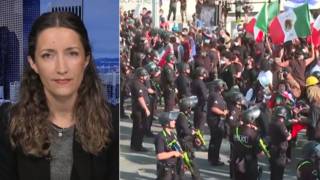
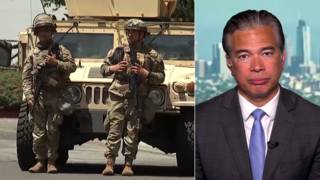
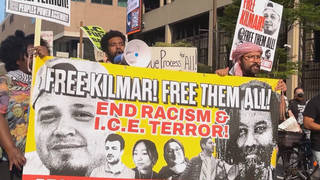
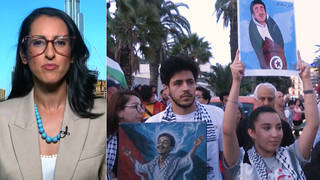
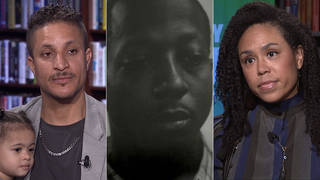
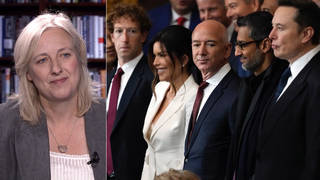

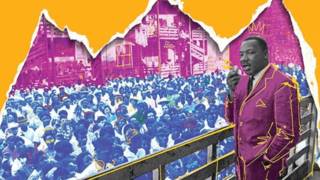

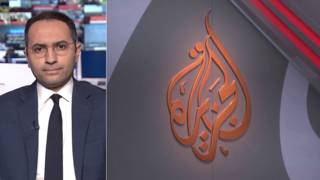


Media Options